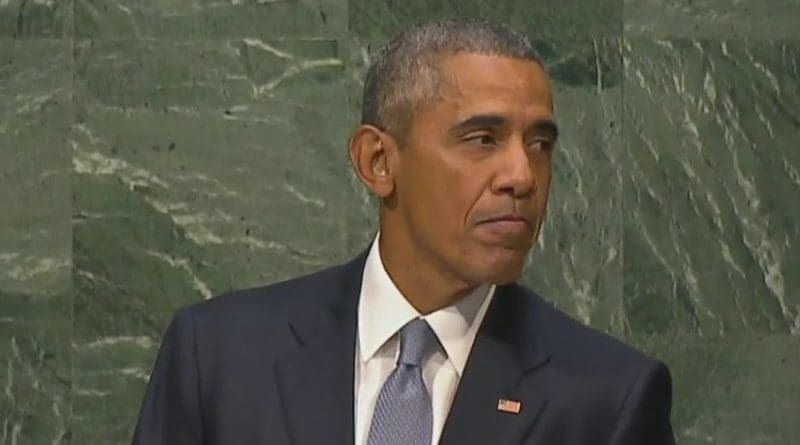President Obama’s Address At 66th UN General Assembly Meeting – OpEd
President Obama’s address to the UN General Assembly yesterday was, for the most part, an encouraging expression of support for universal human rights and the indispensability of political freedom. Obama emphasized the positive developments taking place in the Middle East and North Africa with the Arab Spring, and reiterated his call for democratic change across the region. Ironically, parts of the speech recalled George W. Bush at the height of his much derided “Freedom Agenda,” making the case for the intrinsic link between universal human rights and peace and security.
President Obama paid tribute to the Libyan people and to the international community for their part in liberating Libya. Perhaps his most successful foreign policy initiative to date, this represented a personal high point for Obama in the speech, and gave him an opportunity to bask in the apparent vindication of his—albeit sceptical—acceptance of the need for international intervention.
Obama endorsed the Syrian opposition and heavily criticised the Assad regime for its brutal crackdown against protesters—adding weight to his recent calls for Assad to relinquish power. He called upon the UN Security Council to pass sanctions against Assad, a measure which would intensify the financial pressure currently being applied through US and EU sanctions against the regime. The Syrian revolution may have begun on the ground six months ago, but the diplomatic revolution has only just started, and certainly appears to have a long way to go.
Obama also supported calls for reform in Yemen, calling upon President Saleh to allow a peaceful transition of power followed by free and fair elections. Compared to his critique of other regimes in the Middle East, his criticism was noticeably weaker and even more so with Bahrain, which he describes as a ‘close friend’. The ruling elite’s bloody clampdown of the majority Shia protest movement was not even mentioned, indicating that the US is not willing to jeopardise relations with close regional allies in the Gulf—most importantly, Saudi Arabia.
Ahead of Palestinian Authority President Mahmoud Abbas scheduled speech explaining his reasons for seeking recognition of Palestinian statehood from the UN this week, Obama reiterated his argument that such a move will not advance negotiations between the Palestinians and Israel. Obama adopted a decidedly more critical tone towards the Palestinians than past speeches, arguing that “peace will not come through statements and resolutions at the UN – if it were that easy, it would have been accomplished by now.”
Much of his comments of the Israeli-Palestinian deadlock could be read as a defence of his own record on the peace initiative, an approach which arguably alienated both the Israelis and Palestinians and contributed to the current stalemate. His emphasis on Israel’s right to defend its borders from continuous attacks from terrorist groups and hostile neighbours was expressed firmly and clearly, indicating that he may be sensitive to accusations of “anti-Israel” policies by both Israeli politicians and his political opponents in the US.
Abbas was noticeably displeased throughout Obama’s speech, yet it emerged last night that the Palestinians are prepared to delay seeking a vote on their bid by the UN Security Council, which the US was sure to veto, on the condition that peace talks were resumed. However, Abbas will still take to the podium tomorrow to address General Assembly members.
Perhaps the most disappointing omissions from the human rights abusers cited in the speech were Russia, Iran and Saudi Arabia. Saudi Arabia’s abuses were predictably not mentioned; Iran’s continued and systematic human rights abuses were not given the full recognition they deserved, while Russia’s horrendous record was not even cited. With the collapse of Obama’s much-vaunted “reset” policy—a tacit practice of ignoring Russia’s corruption and human rights abuses in the hopes of securing better diplomatic relations—Obama missed an important opportunity to stand up to the Kremlin. He did, however, seem to make a coded reference to Russia when he mentioned the importance of passing laws banning human rights abusers from entering the US—possibly a reference to the recent State Department visa ban on individuals associated with the death of Russian lawyer Sergei Magnitsky.
Obama’s embrace of the Arab Spring and the affirmation of the necessary connection between democracy and the expansion of peace and security hit the right note. However, his borderline-appeasement of Bahrain and Saudi Arabia, and arguably Russia was disappointing. As Obama rightly pointed out, the world has indeed changed for the better in the year that has passed since his last address to the General Assembly. Osama bin Laden is dead and al-Qaeda’s central leadership is now in a weaker position. The oppressed populations living under dictatorships in Africa and the Middle East have awoken and are calling for the same rights that those in Western countries are able to enjoy. It is now up to the administration to continue to show the leadership and implement the vision which Obama laid down yesterday before the General Assembly.

